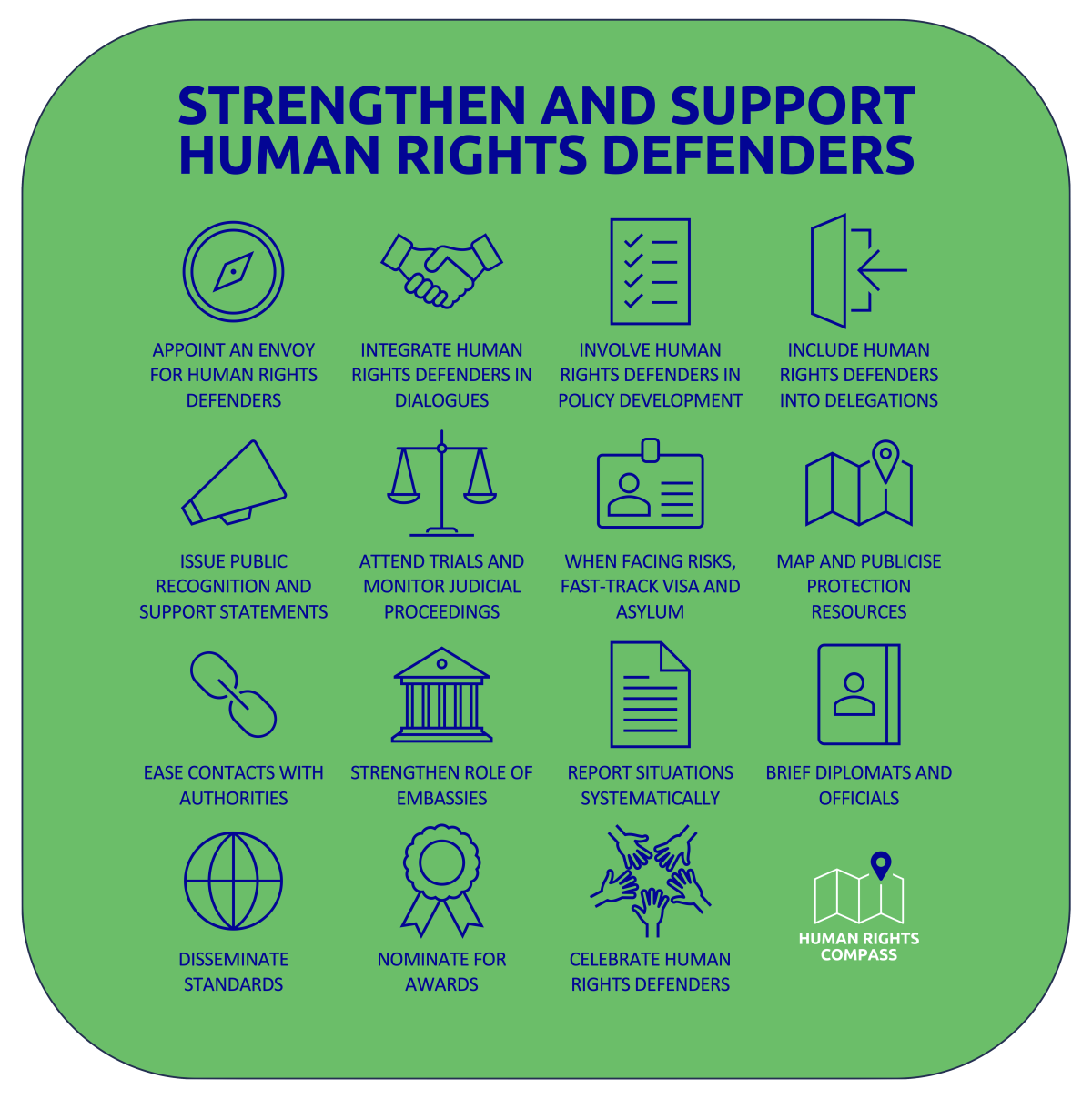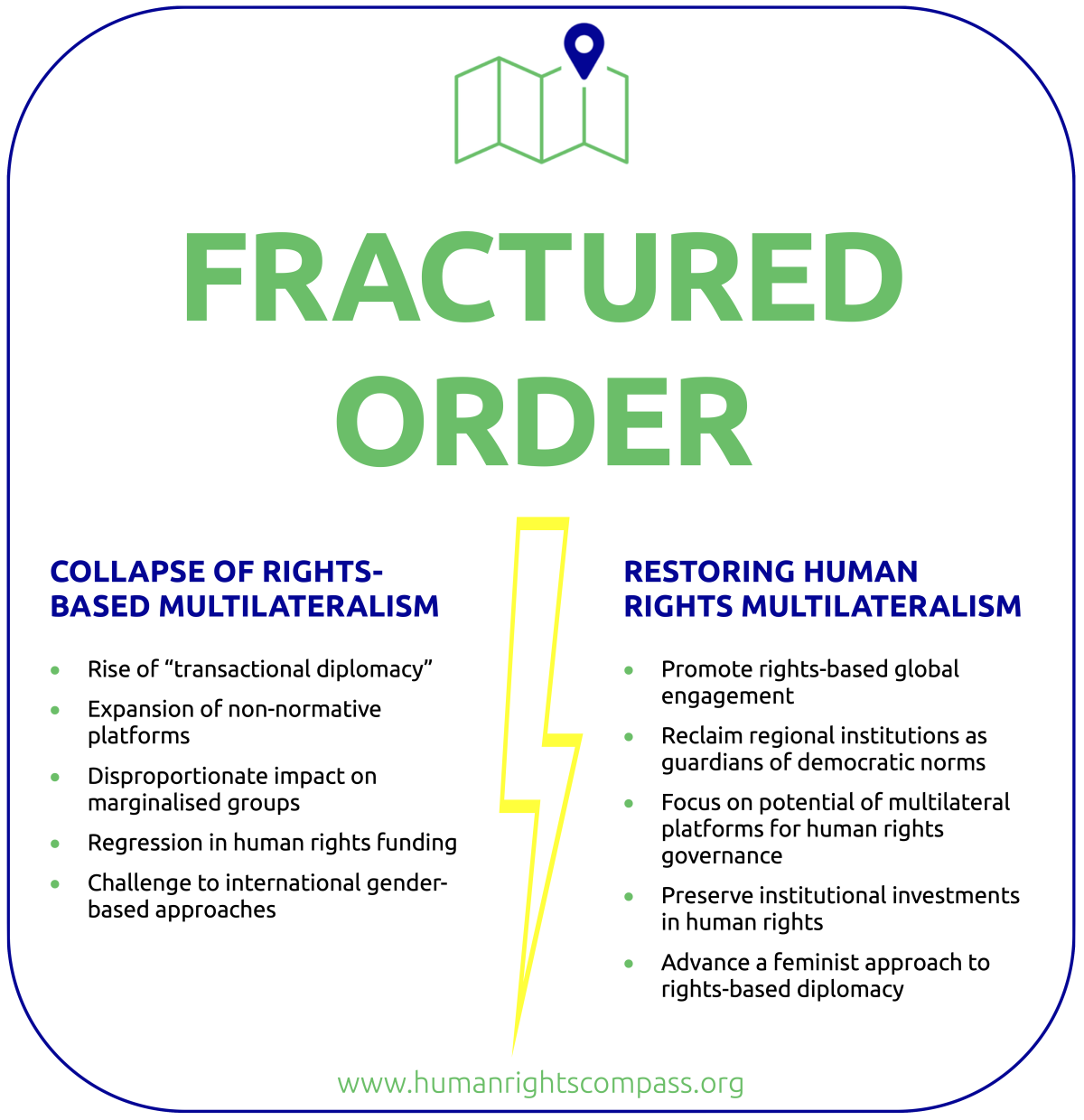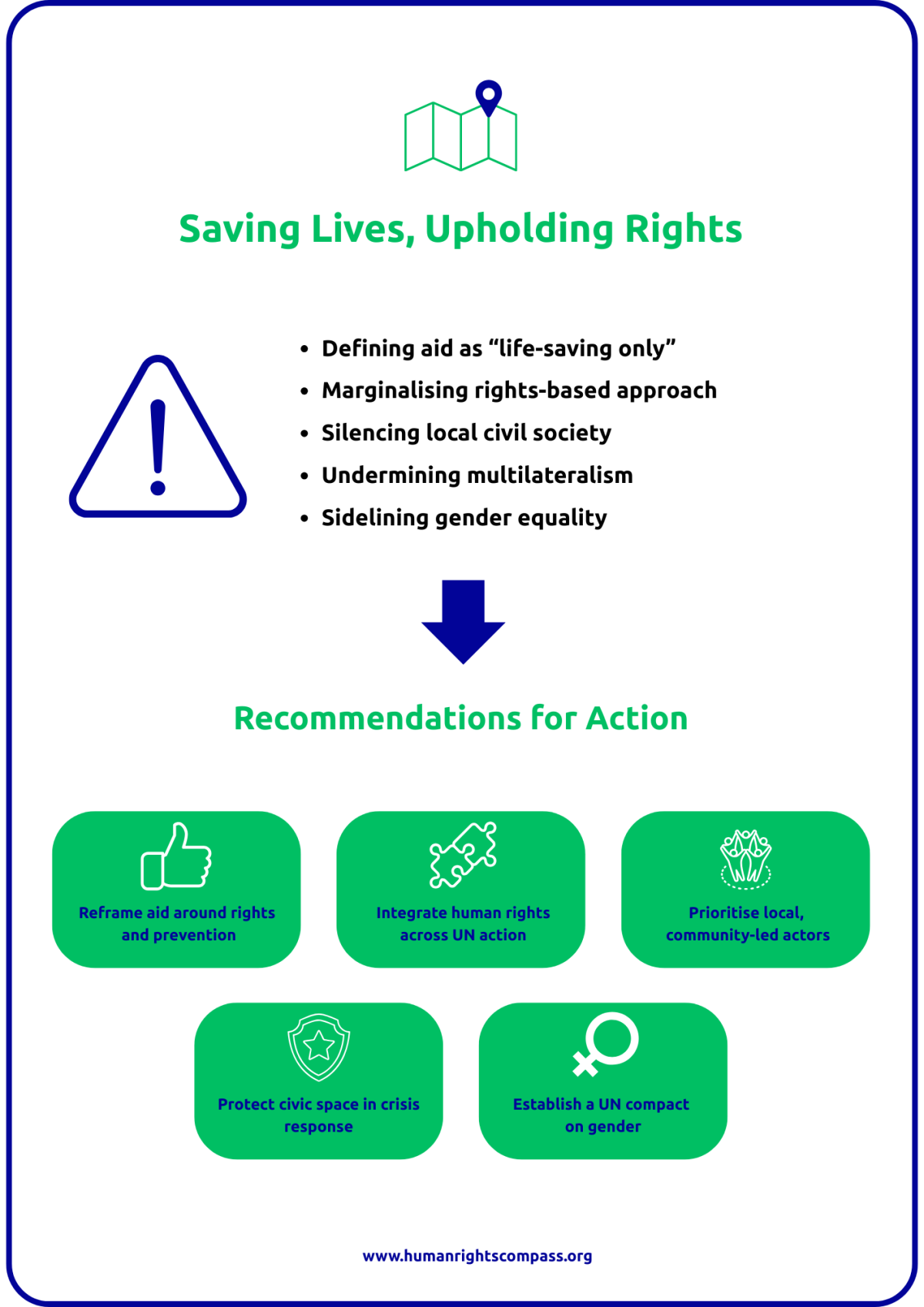Convening Voices for Real-Time Policy and Action to Strengthen Rights
Donald Trump’s second presidency in the United States creates and coincides with shifts in the global human rights landscape. Political instability, policy reversals, and weakening international accountability have disrupted the work of human rights defenders, organisations and institutions, and emboldened autocratic regimes around the world. As human rights frameworks face demise due to policy shifts and funding cuts, the need for coordinated action is urgent.Human Rights Compass is about real-time policy analysis and action. It aims to strengthen human rights as a framework.
DEFENDING DEFENDERSRecommendations to Strengthen and Support Human Rights DefendersAmid Global Realignment
Human Rights Compass Policy Brief of 26 June 2025, resulting from a convening of over 30 leading international human rights organisations and experts, which was held on 27 May 2025.
We are living through a period of profound “global realignment”. The multilateral human rights system — once grounded in universal norms and collective protection — is fracturing under geopolitical pressure. In this context, human rights defenders (HRDs) and the civic ecosystems that sustain them are at the forefront of democratic resilience.
We are living through a period of profound “global realignment”. The multilateral human rights system — once grounded in universal norms and collective protection — is fracturing under geopolitical pressure. In this context, human rights defenders (HRDs) and the civic ecosystems that sustain them are at the forefront of democratic resilience.
Human rights defenders face a convergence of threats every day, including the rise of authoritarianism, legal repression and disinformation as well as the possible withdrawal of political, diplomatic and financial support from traditional allies. The second Trump administration has accelerated this trend, supercharging aid cuts, weakening human rights diplomacy, and emboldening anti-rights actors worldwide. In Europe, this shift compounds the security recalibration triggered by Russia’s aggression against Ukraine, amplifying the inward turn of official development assistance (ODA) and donor agendas.
Across this “fractured order”, human rights defenders are targeted with increasing impunity. In 2024, at least 625 defenders and media workers — one person in every 14 hours — were killed or disappeared, according to UN OHCHR. Many HRDs face criminalisation, persecution (such as arbitrary detentions, lawsuits attacking public participation, known as SLAPP suits, and legal harassment), surveillance, smear campaigns and other forms of intimidation, and forced exile.
The lack of effective accountability mechanisms leads to impunity, which in turn encourages further violations. Failing to investigate, prosecute, and sanction those responsible for attacks against human rights defenders — whether state, corporate, or non-state actors — perpetuates a cycle of violence, deters engagement in human rights, and erodes public trust in both the prosecutorial systems and the HRDs themselves.
Protecting, strengthening and supporting human rights defenders is a moral imperative. It is also a litmus test of our collective ability to resist authoritarianism, uphold democratic values and restore the integrity of the regional mechanisms and the international system. This policy brief offers all actors of goodwill a set of pragmatic recommendations that are grounded in international norms and anchored in the lived realities of those defending rights and democracy on the ground.
An Initiative to Defend Rights in Turbulent Times
Human Rights Compass brings together human rights actors to analyse policy changes in real time, coordinate responses, and build the long-term resilience of the wider human rights community.
We serve as a platform for real-time human rights policy analysis and strategic coordination through:
» Convening key human rights stakeholders for coordinated policy advice and action.
» Publishing policy briefs to inform and guide advocacy.
» Promoting principled responses to systemic challenges that undermine international human rights frameworks.
Our convenings in 2025 will bring together human rights defenders, policy analysts and multilateral actors to examine how the ongoing changes affect international justice, foreign aid and human rights protection, and to discuss appropriate solutions.
We serve as a platform for real-time human rights policy analysis and strategic coordination through:
» Convening key human rights stakeholders for coordinated policy advice and action.
» Publishing policy briefs to inform and guide advocacy.
» Promoting principled responses to systemic challenges that undermine international human rights frameworks.
Our convenings in 2025 will bring together human rights defenders, policy analysts and multilateral actors to examine how the ongoing changes affect international justice, foreign aid and human rights protection, and to discuss appropriate solutions.
FRACTURED ORDERRecommendations to AdvanceHuman Rights Multilateralism
Human Rights Compass Policy Brief of 12 June 2025, resulting from a convening of over 30 leading international human rights organisations and experts, which was held on 13 May 2025.
The integrity of the international human rights system is under threat as geopolitical realignmentaccelerates the dismantling of multilateral norms. The collapse of US leadership under the second Trump administration, coupled with consolidation of authoritarianism in Russia, China and their allies, has enabled the deliberate degradation of intergovernmental institutions designed to uphold universal rights.
The integrity of the international human rights system is under threat as geopolitical realignmentaccelerates the dismantling of multilateral norms. The collapse of US leadership under the second Trump administration, coupled with consolidation of authoritarianism in Russia, China and their allies, has enabled the deliberate degradation of intergovernmental institutions designed to uphold universal rights.
This crisis is both structural and ideological: the very concept of rights-based governance is being replaced by “transactional” diplomacy, increased securitisation, and regressive nationalist agendas.
Human rights mechanisms — from the United Nations Human Rights Council to regional bodies such as the Organization for the Security and Cooperation in Europe or Council of Europe — are being increasingly undermined by states withdrawing from human rights bodies, reneging on their international commitments, cutting funding, rejecting accountability, and promoting regressive norms. Meanwhile, the rise of non-normative multilateral platforms, such as the Shanghai Cooperation Organisation, has empowered repressive regimes in terms of action and rhetoric.
For over a decade, rights-based approaches have been framed as an existential threat to 'traditional values' and security by authoritarians and populists alike.
Without urgent action, the international community risks becoming entrenched in a dystopian “new normal” where militarisation and exclusion take precedence over the indivisibility and universality of human rights. Only a deliberate effort to restore human rights multilateralism can counter this fractured order.
SAVING LIVES,UPHOLDING RIGHTS
Recommendations to Bridge Humanitarian Aid and Human Rights Amid Global Realignment
Recommendations to Bridge Humanitarian Aid and Human Rights Amid Global Realignment
Human Rights Compass Policy Brief of 12 May 2025, resulting from a convening of over 30 leading international human rights organisations and experts, which was held on 15 April 2025.
The 2025 Global Humanitarian Overview estimated that over 300 million people in 73 countries were in need of humanitarian assistance as of late February 2025 – enduring severe suffering due to protracted conflicts, economic instability, climate emergencies and displacement. Global needs were expected to rise and the funding to decline. At about the same time, the shockwaves of the Trump administration’s decision to abruptly freeze and cancel several types of government funding reverberated through the international humanitarian community.
The 2025 Global Humanitarian Overview estimated that over 300 million people in 73 countries were in need of humanitarian assistance as of late February 2025 – enduring severe suffering due to protracted conflicts, economic instability, climate emergencies and displacement. Global needs were expected to rise and the funding to decline. At about the same time, the shockwaves of the Trump administration’s decision to abruptly freeze and cancel several types of government funding reverberated through the international humanitarian community.
The reduction in foreign aid is global: even countries with a longstanding tradition of donorship have recently “deprioritised” foreign aid funding and plan further cuts.
The proportion of global assistance funding allocated to human rights is modest — and also affected by these cuts. For example, in 2023 almost 45% of USAID foreign aid went to disaster relief, humanitarian aid and vital healthcare programmes, whereas only 3.2% was spent on human rights and the rule of law. In absolute terms, funding for human rights has always been infinitesimal compared to allocations on humanitarian aid. Yet its worldwide impact has been considerable in terms of improving human security.
The increased scarcity of resources caused by the Global Realignment exacerbates a perceived trade-off between humanitarian and human rights work. This risks further marginalising, politicising human rights and reducing related funding. This trend is not limited to authoritarian regimes or populist agendas, but is permeating political and policy dialogues more widely.
To halt this trend, it is urgent to reaffirm that humanitarian crises are also human rights crises, and that humanitarian efforts and human rights work are complementary. It is important – and urgent – to debunk the false dichotomy suggesting that “life-saving” relief can operate outside a rights-based framework or that human rights are disconnected from people’s survival and dignity.
GLOBAL REALIGNMENT
Recommendations on how to avoid an adverse impact on human rights
Human Rights Compass Policy Brief of 15 April 2025, resulting from a convening of over 30 leading international human rights organisations and experts, which was held on 25 March 2025.
The beginning of Donald Trump’s second presidency in the United States is creating, and coinciding with, attacks on the global human rights landscape. Since 20 January 2025, the world has witnessed the erosion of the rule of law in the US and the unravelling of a system that has shaped the international order for the past 80 years — the multilateral rules-based order based on the Franklin Roosevelt blueprint of collective security, economic multilateralism and political self-determination.
In barely two months, the new administration has terminated critical humanitarian aid; withdrawn from international organisations, fora and agreements, notably the climate, health and human rights platforms; curtailed long-standing support for human rights and democratisation efforts abroad; and challenged economic, political and security alliances. It rejected the principles of diversity, equality and inclusion, empowered anti-LGBTQ and racist rhetoric, and accelerated the backlash against gender equality and women’s rights.
The void left by the Trump administration’s approach to democracy, multilateralism, and human rights is immense and requires an urgent response from political leaders and civil society.
New leadership and new frameworks are needed to protect human rights and rule of law in this context. New approaches and new coalitions - on the state and civil society level — should fill the void and human rights must be at the heart of any new order that emerges.
The beginning of Donald Trump’s second presidency in the United States is creating, and coinciding with, attacks on the global human rights landscape. Since 20 January 2025, the world has witnessed the erosion of the rule of law in the US and the unravelling of a system that has shaped the international order for the past 80 years — the multilateral rules-based order based on the Franklin Roosevelt blueprint of collective security, economic multilateralism and political self-determination.
In barely two months, the new administration has terminated critical humanitarian aid; withdrawn from international organisations, fora and agreements, notably the climate, health and human rights platforms; curtailed long-standing support for human rights and democratisation efforts abroad; and challenged economic, political and security alliances. It rejected the principles of diversity, equality and inclusion, empowered anti-LGBTQ and racist rhetoric, and accelerated the backlash against gender equality and women’s rights.
The void left by the Trump administration’s approach to democracy, multilateralism, and human rights is immense and requires an urgent response from political leaders and civil society.
New leadership and new frameworks are needed to protect human rights and rule of law in this context. New approaches and new coalitions - on the state and civil society level — should fill the void and human rights must be at the heart of any new order that emerges.
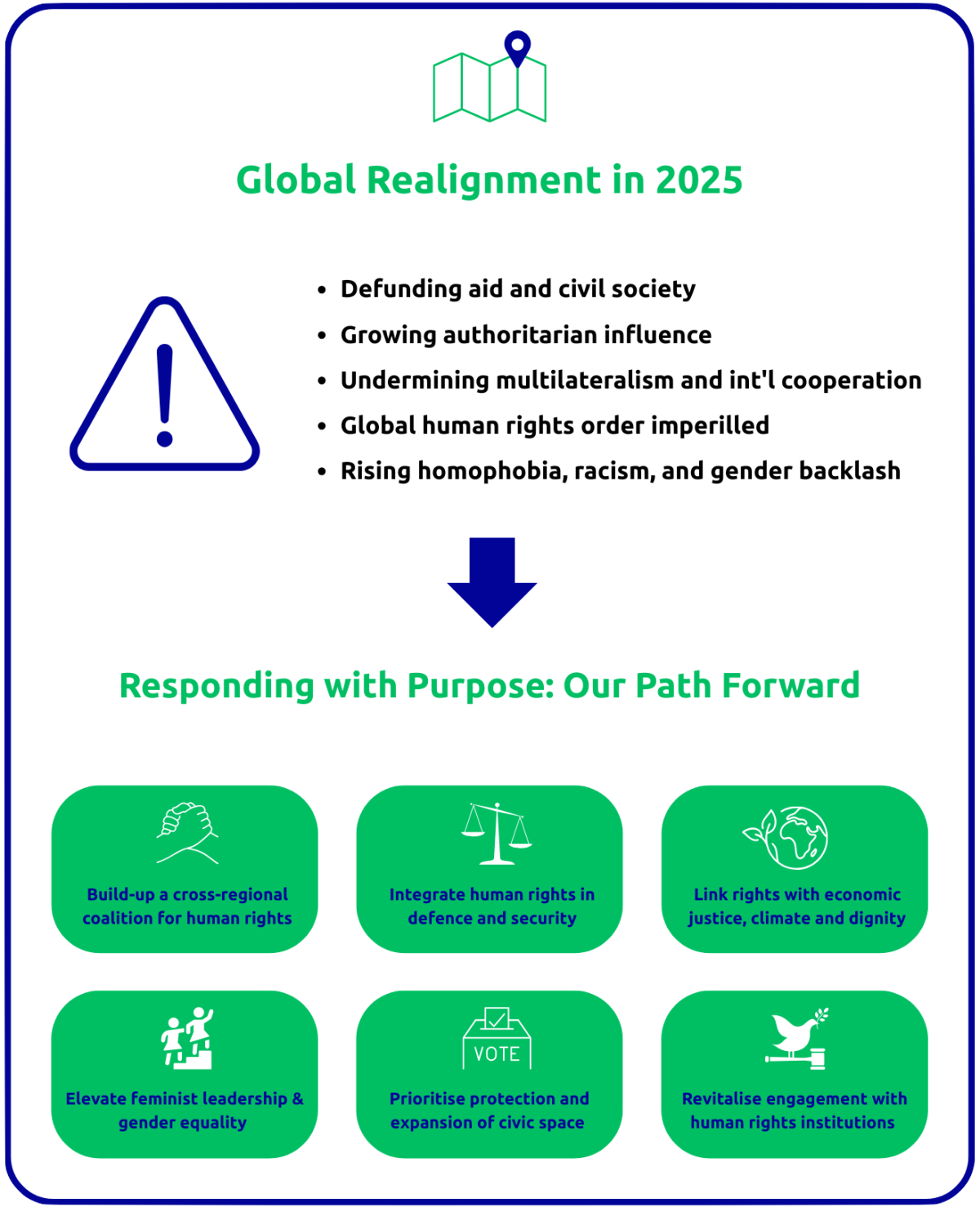
Human Rights Compass is endorsed by:
Over 100 human rights defenders and experts contribute to Human Rights Compass and participate in its Convenings. Some human rights defenders and their organisations prefer not to endorse Human Rights Compass publicly for security reasons.
Gunnar Ekeløve-Slydal
Human Rights Compass has already proven to be a valuable meeting place for longer-term and more profound reflections on the challenges of multinational human rights work than other forums permit. We need such initiatives to reconsider our strategies and visions for future human rights promotion in a time when authoritarian governments and values are challenging international organisations and international law in many ways.

Human Rights Compass
Sed pede ullamcorper amet ullamcorper primis, nam pretium suspendisse neque, a phasellus sit pulvinar vel integer.

Mamikon Hovsepyan
As an LGBT+ rights activist in Armenia, I endorse Human Rights Compass. The policy analysis, convenings of leading human-rights organisations, and practical policy briefs strengthen protections for defenders and help mobilize international support for vulnerable communities like ours. In a period of shrinking civic space and rising anti-LGBT rhetoric, this initiative is an essential tool for coordinated advocacy. I am glad to engage with this work and amplify the recommendations.
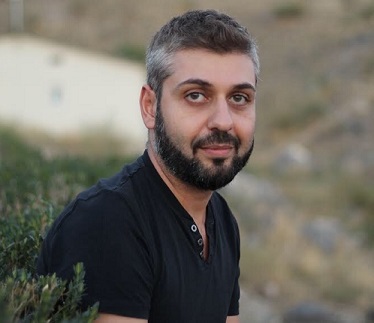
HUMAN RIGHTS COMPASS
Initiative is powered by Geneva-based Progress & Change Partnerships and
Berlin-based Palimpsest GmbH.
All rights reserved, © Progress & Change Partnerships, 2025

